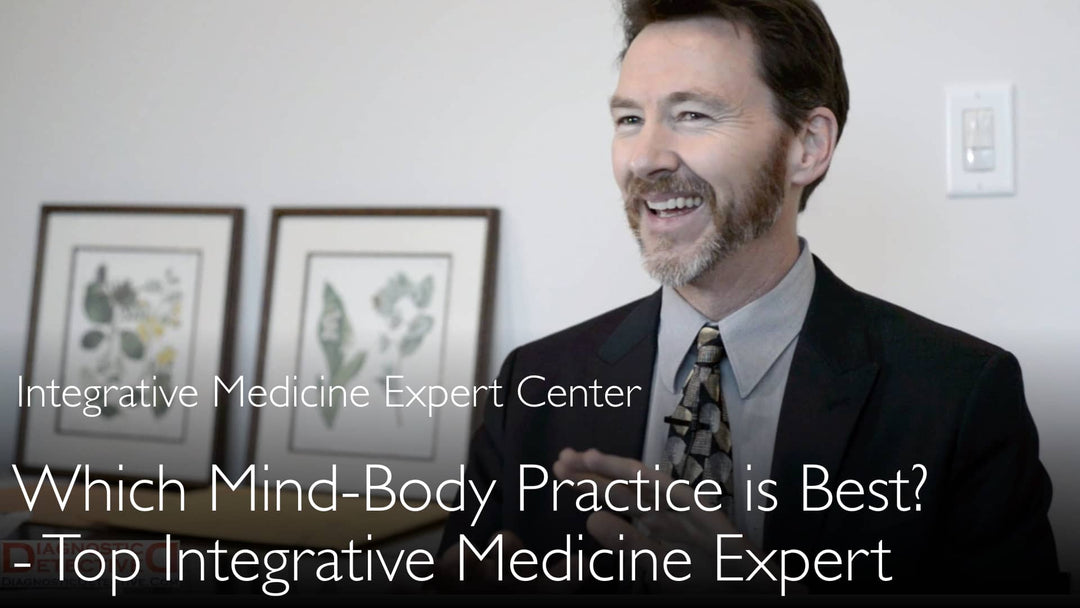Dr. Anton Titov, MD, discusses with Dr. Barrows how integrative medicine can be tailored to individual needs, ensuring that patients receive the most effective and personalized treatment.
Choosing the Best Mind-Body Medicine Practices for Parkinson's and Migraine
Jump To Section
- Importance of Evidence-Based Research
- Tai Chi for Parkinson's Disease
- Biofeedback for Migraine Relief
- Role of Cultural and Personal Preferences
- Integrative Medicine in Hospital Settings
- Patient-Centered Approach in Mind-Body Medicine
- Full Transcript
Importance of Evidence-Based Research
Dr. Kevin Barrows, MD, emphasizes the critical role of evidence-based research in selecting mind-body medicine practices. He advises that the best approach is to start with what research has proven effective. This ensures that patients receive therapies that are not only safe but also have a track record of success in treating specific conditions.
Tai Chi for Parkinson's Disease
For patients with Parkinson's disease, Dr. Barrows recommends tai chi as a beneficial mind-body practice. Research has shown that tai chi can improve balance and reduce the risk of falls in Parkinson's patients. This makes it a preferred choice for those seeking non-pharmacological interventions to manage their symptoms.
Biofeedback for Migraine Relief
Dr. Kevin Barrows, MD, highlights biofeedback as an effective therapy for migraine relief. This mind-body practice helps patients gain control over physiological functions, potentially reducing the frequency and severity of migraine attacks. Biofeedback is a non-invasive option that can complement other migraine treatments.
Role of Cultural and Personal Preferences
Dr. Barrows acknowledges that cultural and personal preferences play a significant role in choosing the right mind-body practice. He suggests that understanding a patient's background and interests can guide the selection process, ensuring that the chosen therapy aligns with the patient's values and lifestyle.
Integrative Medicine in Hospital Settings
In hospital settings, Dr. Kevin Barrows, MD, notes that practices like hypnosis and guided imagery are often used around surgical procedures. These therapies can help reduce anxiety and improve recovery outcomes. Integrative medicine in hospitals focuses on enhancing patient care through complementary therapies.
Patient-Centered Approach in Mind-Body Medicine
Dr. Kevin Barrows, MD, stresses the importance of a patient-centered approach in mind-body medicine. By engaging patients in the decision-making process and considering their preferences, practitioners can foster motivation and adherence to the chosen therapy. This personalized approach is a cornerstone of effective integrative medicine.
Full Transcript
Dr. Anton Titov, MD: How to choose the best Mind-Body practice? Which mind-body therapy fits best for which disease? Mind-body practice for Parkinson's disease. Best mind-body practices for hospital settings. Hypnosis, guided imagery. Tai chi for Parkinson's disease. Biofeedback for migraine. How to select a Mind-Body practice for the medical problem I have?
Medical second opinion ensures that migraine and cluster headache diagnosis is correct and complete. Medical second opinion also helps to choose the best holistic natural treatment strategy for migraine and cluster headache. Seek medical second opinion on migraine and cluster headache and be confident that your treatment is the best.
Dr. Anton Titov, MD: How to choose the best Mind-Body practice? Parkinson's disease. These are examples of diseases that many patients have. Integrative Medicine is beneficial. So it is very important to choose the best Mind-Body Integrative Medicine practice. It could benefit a patient the most. Do you see any difference in some of the Integrative Medicine Mind-Body practices? For example, yoga, tai chi, and massage therapy. Perhaps some other Mind-Body practices?
How do you choose the best mind-body practice that will benefit the patient the most? Is the choice of Mind-Body practice based on cultural and personal preference? Is there a difference between different types of mind-body practices?
Dr. Kevin Barrows, MD: Yes, that's a great question. We do factor in personal and cultural preference for sure. But the fundamental way to choose the best mind-body medical practice for each patient is to look at the research. You look at the evidence. We have studies that show tai chi helps patients with Parkinson's disease. So a mind-body medicine therapy for a Parkinson's disease case would be tai chi.
We know biofeedback can help relieve migraine. So that might be our first choice for migraine. Hypnosis and guided imagery are often effective in a hospital setting around procedures. Before someone is going to get a surgery or procedure done. Or you can do guided imagery and hypnosis during or after surgery.
So I start with the research. What we know to be true about where these mind-body therapies are effective. And then I match them up with a patient. But you're correct about the cultural and the personal preferences. The way I try to help someone choose a mind-body medicine is to learn a little bit about them. I then give the patient just a preliminary description of each mind-body medical practice. So I can see what interests them. I can see what gets them excited.
Then I favor the Mind-Body practice where we have research evidence. But ultimately it has to be something they want to do and that they are motivated to practice.
Dr. Anton Titov, MD: So that's important and that's part of the concept of integrative medicine. To look at what is evidence-based. What works based on what experience and evidence. And choosing the best Mind-Body practice in accordance with the cultural preferences and personal preference of the patient.
Dr. Kevin Barrows, MD: Exactly, it does display those two principles. Yes, adherence to the evidence-based principle. But also the awareness about the patient's psychology. We have to tune into the patient.




